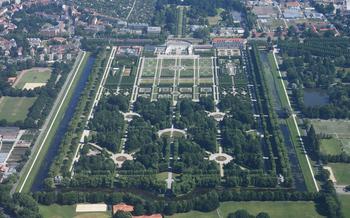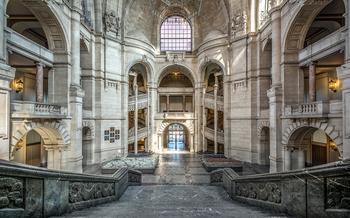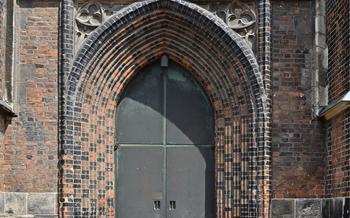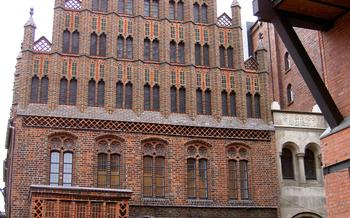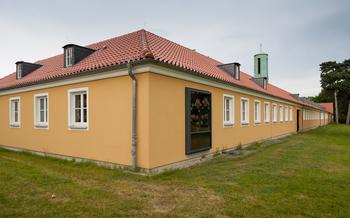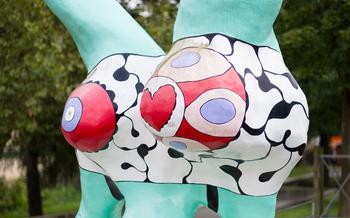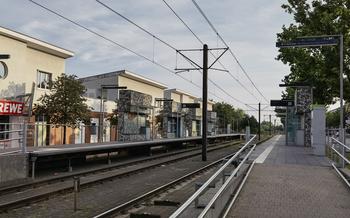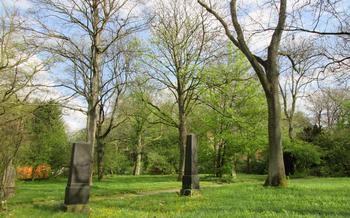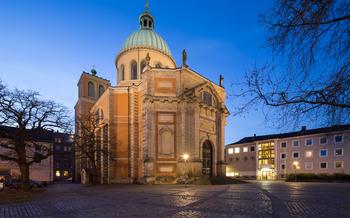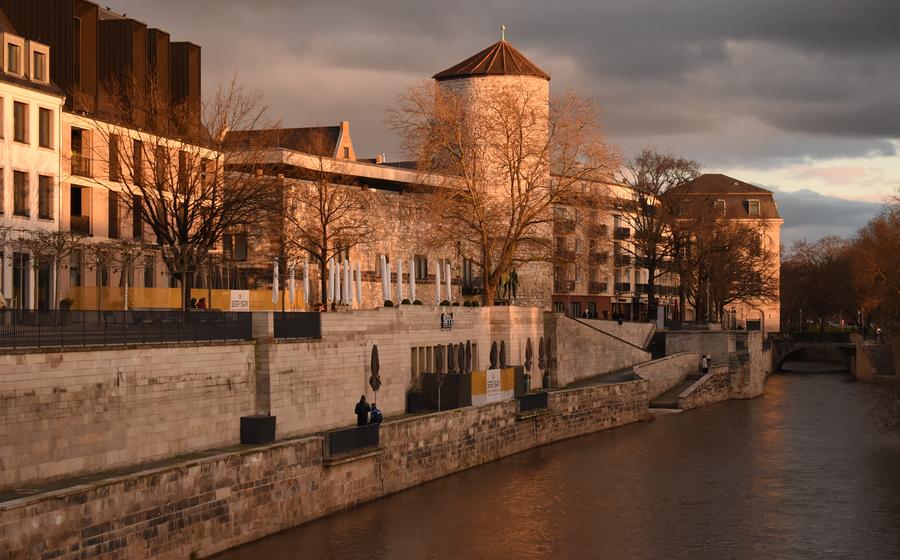
Hannover School Museum
- Hannover School Museum: A Journey Through Educational History
- Preserving Educational Heritage
- Interactive Exhibits for All Ages
- Classroom Recreations: A Journey Through Time
- School Supplies and Equipment
- Educational Reforms and Movements
- Teachers' Perspectives
- Extracurricular Activities
- School Discipline and Punishment
- Impact on Modern Education
- Special Exhibitions and Events
- Educational Workshops and Programs
- Insider Tip: Guided Tours
Hannover School Museum: A Journey Through Educational History
Step into the Hannover School Museum, a captivating journey through the evolution of education. Immerse yourself in the rich history of learning and teaching methods as you explore this treasure trove of educational artifacts and interactive displays. The museum's unique collection takes you on an immersive voyage, showcasing the ingenuity and dedication of educators throughout the ages who have shaped the minds of generations. Discover the stories behind groundbreaking educational theories, marvel at the tools that revolutionized learning, and gain a fresh perspective on the ever-evolving landscape of education.
Preserving Educational Heritage
The Hannover School Museum stands as a testament to the rich educational heritage of Germany. Its historical context is deeply intertwined with the evolution of educational methods and theories. In the 19th century, Hanover was a hub of educational reform, and the museum's exhibits shed light on the innovative approaches that were pioneered here.
The museum's collection includes artifacts and documents that trace the development of educational practices from the early days of formal schooling to the present day. Visitors can explore the changing role of teachers and students, as well as the impact of key educational reforms and movements.
By preserving this heritage, the Hannover School Museum plays a crucial role in helping us understand the roots of modern education. It offers a unique opportunity to learn about the challenges and triumphs that have shaped the way we teach and learn today.
Interactive Exhibits for All Ages
The Hannover School Museum offers a captivating and interactive experience through its immersive displays. Designed to appeal to visitors of all ages, the museum features a range of hands-on activities that make learning fun and engaging. Visitors can explore different learning styles and approaches, as they interact with educational exhibits that bring history to life. These interactive displays encourage curiosity and critical thinking, fostering a deeper understanding of educational practices throughout the ages.
Classroom Recreations: A Journey Through Time
Imagine stepping into a classroom from a bygone era, where wooden desks are neatly arranged in rows, inkwells adorn each desk, and a blackboard stands at the front of the room. At the Hannover School Museum, this immersive experience becomes a reality through meticulously reconstructed historical classrooms. These recreated spaces offer a unique glimpse into the evolution of learning environments and teaching methods.
Visitors can explore classrooms from different time periods, each showcasing the distinct characteristics of its era. From the simplicity of early one-room schoolhouses to the more structured classrooms of the 19th and 20th centuries, these recreations provide a tangible connection to the past.
Through these immersive exhibits, visitors gain insights into the changing role of teachers and students. They can imagine the lessons that took place within these walls, the challenges faced by educators, and the experiences of students as they navigated their educational journeys.
The recreated classrooms serve as a reminder of the rich history of education and the dedication of those who have shaped it. They offer a unique opportunity to understand the evolution of classroom design, teaching practices, and the ever-changing relationship between teachers and students.
School Supplies and Equipment
In addition to the interactive exhibits and classroom recreations, the Hannover School Museum houses a fascinating collection of historical school supplies and equipment. These items provide a glimpse into the changing nature of educational materials over time. Visitors can examine slates, inkwells, and quills used in the 18th century, as well as early textbooks, globes, and microscopes. The museum also displays a variety of more contemporary items, such as typewriters, calculators, and computers, highlighting the evolution of educational technology.
Through these artifacts, visitors gain insights into the challenges faced by students and teachers in the past. For example, they learn about the difficulties of writing with a quill pen and the importance of inkwells, which were essential for storing and transporting ink. They also discover how textbooks and other teaching aids have evolved over time, reflecting changes in educational methods and curriculum.
The display of historical school supplies and equipment not only provides a fascinating glimpse into the past but also helps visitors appreciate the tools that shaped education. By understanding the challenges and innovations of the past, we can better appreciate the educational opportunities we have today.
Educational Reforms and Movements
The Hannover School Museum delves into the fascinating world of educational reforms and movements that have shaped teaching practices and curricula throughout history. Visitors can explore the impact of influential figures such as Johann Heinrich Pestalozzi, Friedrich Fröbel, and Maria Montessori, whose innovative ideas revolutionized the way children were taught. Through interactive exhibits, visitors can gain insights into the progressive methods and philosophies that challenged traditional educational norms and laid the foundation for modern educational approaches. The museum highlights the historical context of these movements, showcasing how they responded to societal changes, cultural shifts, and evolving understandings of child development. By exploring these educational reforms, visitors can appreciate the pioneers who dared to challenge the status quo and left an indelible mark on the history of education.
Teachers' Perspectives
The Hannover School Museum sheds light on the lives and experiences of historical teachers, providing a glimpse into their challenges, motivations, and teaching methods. These dedicated individuals played a crucial role in shaping educational history, and their stories offer valuable insights into the evolution of education.
Visitors can explore the personal artifacts, diaries, and lesson plans of these educators, gaining a deeper understanding of their struggles and triumphs. The museum also highlights the impact of social, cultural, and political changes on the teaching profession, showcasing how teachers adapted to evolving societal norms and expectations.
By delving into the experiences of historical teachers, visitors can develop a newfound appreciation for the dedication and passion that educators have brought to their work throughout time. These individuals were not only responsible for imparting knowledge but also for shaping the minds and characters of countless students, leaving a lasting impact on society.
Extracurricular Activities
In addition to formal lessons, the Hannover School Museum also sheds light on the extracurricular activities that enriched the lives of students in the past. These activities played a crucial role in fostering personal development, social skills, and a sense of community.
The museum showcases a variety of historical extracurricular clubs and activities, such as sports teams, music ensembles, drama clubs, and student government organizations. Visitors can explore the artifacts, uniforms, and equipment used by these groups, gaining insights into the passions and interests of students from different eras.
One of the highlights of this section is the recreation of a historical school gymnasium. Visitors can step back in time and imagine themselves participating in physical education classes or engaging in competitive sports matches. The museum also features a replica of a school stage, complete with vintage props and costumes, providing a glimpse into the vibrant theater and drama productions that took place in schools.
By showcasing these extracurricular activities, the Hannover School Museum emphasizes the importance of holistic education. These activities provided students with opportunities to develop their talents, build relationships, and learn valuable life skills that extended beyond the classroom.
School Discipline and Punishment
The Hannover School Museum also delves into the intriguing and often unsettling history of school discipline and punishment. Visitors will encounter exhibits that showcase historical methods of maintaining order in the classroom, from the use of corporal punishment to more psychological approaches. These displays provide a sobering reminder of the ways in which children were treated in the past and offer valuable insights into the evolving attitudes towards student behavior.
Through interactive displays and historical artifacts, the museum explores the changing perceptions of what constitutes acceptable behavior in the classroom. Visitors can learn about the historical justifications for harsh punishments, such as the belief that physical pain was an effective deterrent to misbehavior. They will also discover how societal attitudes towards children and the role of education have influenced disciplinary practices over time.
The museum's exploration of school discipline and punishment serves as a powerful reminder of the importance of understanding the historical context of educational practices. It encourages visitors to reflect on the ways in which past approaches have shaped modern understandings of child psychology and educational philosophy. By examining the history of school discipline, the museum provides a valuable opportunity to appreciate the progress that has been made in creating more humane and effective educational environments.
Impact on Modern Education
The Hannover School Museum serves as a valuable resource for understanding the roots of contemporary educational practices. By tracing the evolution of teaching methods, classroom design, and educational theories, the museum sheds light on the historical foundations of modern education. Visitors can gain insights into how past approaches to learning have influenced current practices, appreciating the legacy of educational pioneers who have shaped the field.
The museum's exhibits highlight the continuity and change in educational approaches, demonstrating how past innovations have paved the way for modern teaching methods. This historical perspective allows visitors to appreciate the evolution of education, recognizing the enduring principles that have stood the test of time, as well as the innovative approaches that have transformed the educational landscape.
Special Exhibitions and Events
The Hannover School Museum regularly hosts special exhibitions and events that explore unique themes and topics not covered in the permanent exhibits. These temporary displays offer a fresh perspective on educational history and showcase the museum's diverse collection. Visitors can expect to encounter engaging and thought-provoking exhibitions on various aspects of education, from historical teaching methods to the evolution of student life.
Special events at the museum provide an opportunity for visitors to delve deeper into educational history through lectures, workshops, and interactive activities. These events often feature guest speakers, educators, and historians who share their expertise on specific topics. Whether you're interested in the history of school uniforms, the role of technology in education, or the lives of famous teachers, the Hannover School Museum's special exhibitions and events offer something for everyone.
To stay up-to-date on the latest offerings, visitors are encouraged to check the museum's website or social media pages. By attending special exhibitions and events, visitors can gain a more comprehensive understanding of educational history and appreciate the diverse stories and perspectives that have shaped modern education.
Educational Workshops and Programs
The Hannover School Museum offers a diverse range of educational workshops and programs that cater to visitors of all ages and interests. These programs provide an opportunity for hands-on learning, in-depth study, and exploration of various educational themes.
One popular workshop series focuses on the history of writing and calligraphy. Participants can learn about the evolution of writing tools and techniques, from ancient clay tablets to modern word processors. They can also try their hand at writing with a quill pen and ink, and create their own illuminated manuscripts.
Another popular program is the "Science in the Classroom" workshop, which introduces participants to historical scientific experiments and demonstrations. Visitors can explore the wonders of physics, chemistry, and biology using simple materials and techniques that were available to students in the past.
For those interested in the history of education, the museum offers a workshop on "Educational Reformers and Movements." Participants can learn about the lives and ideas of influential educational thinkers, such as Johann Heinrich Pestalozzi, Friedrich Fröbel, and Maria Montessori. They can also discuss the impact of these reformers on modern educational practices.
These educational workshops and programs are led by experienced educators and historians who are passionate about sharing their knowledge with visitors. They provide a unique opportunity to engage with the museum's collection and resources, and to gain a deeper understanding of educational history and its relevance to modern education.
Insider Tip: Guided Tours
To truly immerse yourself in the history of education and make the most of your visit to the Hannover School Museum, I highly recommend booking a guided tour. A knowledgeable and experienced guide will lead you through the exhibits, providing insightful commentary and answering your questions. They will help you understand the significance of the artifacts, the evolution of educational methods, and the impact of key educational reforms.
I had the pleasure of taking a guided tour during my visit, and it was an incredibly enriching experience. My guide was passionate about the museum's collection and shared fascinating stories and anecdotes about the history of education. She pointed out details that I would have missed on my own, and her insights brought the exhibits to life.
Whether you're a history buff, an educator, or simply curious about the evolution of education, I highly recommend booking a guided tour at the Hannover School Museum. It's an investment that will pay off in a deeper understanding and appreciation of the museum's treasures.
